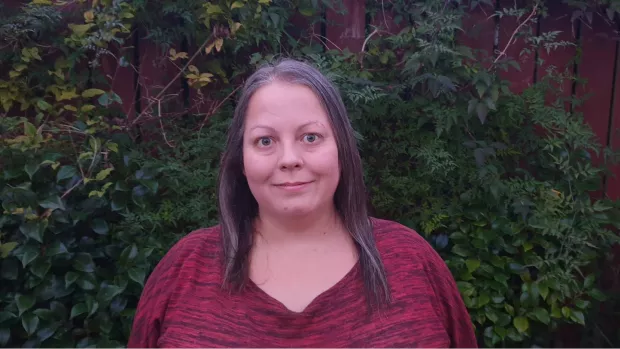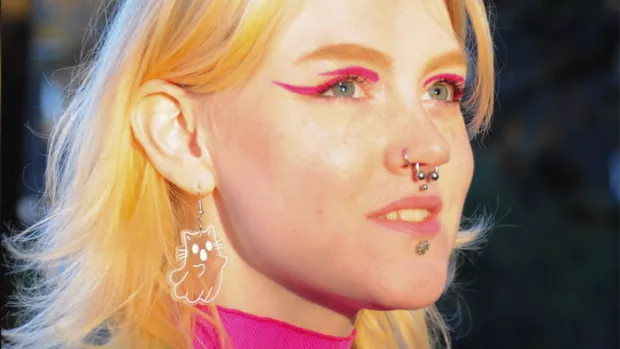
Me vs the Gossamer MonSter - my MS journey
As part of the MS Awareness Week MS Unfiltered campaign, Linsey shares her journey with MS diagnosis and managing her mental health.
I got diagnosed with MS in the summer of 2021 by a general neurologist. Then officially with relapsing remitting MS in October 2021 by my MS consultant. Coming to terms with MS is like riding an emotional roller coaster, and honestly, I'm still struggling to accept my new 'friend'.
MS is a snowflake disease, with everyone facing different symptoms. And I think the mental health aspect is no different. I hope that by sharing my experience, it might help others who are joining the MS gang – although it’s not a gang we’d choose to be part of.
It’s a marathon, not a sprint
There's no magic fix to accepting having MS, just like there's no magic fix for MS (for now). For me, it helped to give my MS MonSter a name, to distance myself from it. It doesn't sit well with me to think of myself attacking my own body. So, I came up with Gossamer. Now, I can happily give him a piece of my mind when I'm feeling down and my symptoms flare up!
When it comes to talking about my MS and updating people on how I'm doing, even on the really tough days, I usually just say I'm fine. I don't want pity, and despite needing help at times, I'm not keen on agreeing to it.
Recently, though, I've been slowly opening up a bit more and letting people in. I find it far easier to share what I'm going through by writing in my blog which I started a few years ago. Plus, it gives family and friends the option to read it or not.

My dotty brain
Adjusting to having MS involves dealing with its unpredictability. I've always believed in hitting it hard with the highest DMT I qualify for. I started with Tecfidera, but after a year, my MRI showed my brain was getting a bit ‘dottier’. Now, I'm on Kesimpta, a highly effective DMT. I'm yet to find out if it has stopped the progression.
Out of the numerous MRI results I've had in the past few years, only one came back with no new lesions. So it’s perhaps not that surprising that I struggle to come to terms with my new ‘friend’. I’m waiting on the results of a recent one – fingers crossed!
Sometimes it's good to talk
I try my best to be open and honest with my MS team. In my second-to-last appointment, I shared that I randomly burst into tears – not something that ever happened pre-diagnosis. I'm generally an eternal optimist and pretty content most of the time. But I make sure the tears always happen in private – heaven forbid I share this with the outside world. After sharing this with my consultant, I agreed for her to refer me to the mental health team. I've also joined the waiting list for CBT at my local MS Centre, MS Revive.
I recently had an assessment with the Mental Health team to figure out what could help me. I've had plenty of nerve-wracking appointments over the past few years, but this one was the most daunting – talking to strangers about how I'm feeling!

The two ladies who took the appointment were lovely. They covered everything – my support network, how I've been feeling, my home and work life. I let my guard down and spilled everything. In the end, they're referring me to a chronic health support group. Thankfully, they felt I wasn't suffering from depression, just overwhelmed by my new condition.
My MS gangs
Talking to other people with MS also helps. I've joined a few groups, including the MS Society forum, a Facebook group, and even a Reddit thread.
It's great to chat with people who truly understand what I'm going through, and it also helps to support others navigating MS. I'm lucky to have an MS centre just a 10-minute drive from me.
They've been wonderful, assisting me with strength training. Talking to others also on the MS journey has been lovely.
But it's worth pointing out that the DMTs available now are far better than in the past. People who’ve had MS for a long time, or aren’t eligible for DMTs, or have decided not to take them, might have more progression than someone recently diagnosed with MS. That doesn’t always hold true – remember the snowflake disease description! But it does mean that, while I gain a lot from talking to my MS community, I try my best not to compare or imagine how I'll be in the future.
I wish I had a magic wand to help everyone come to terms with MS. My best bit of advice? Talk about it to friends and family and focus on what you can still do – not what you can’t.


